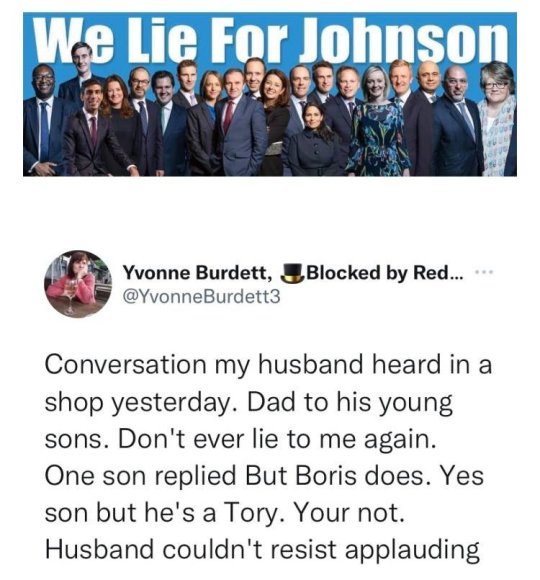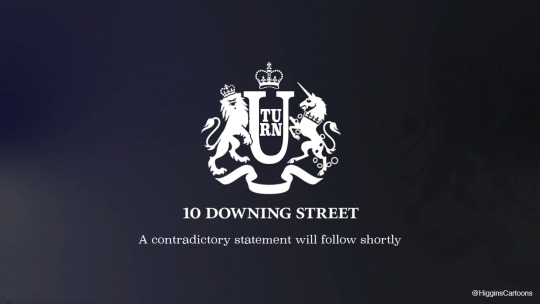#boris is incapable of telling the truth
Photo


#UK politics#boris johnson#alexander boris de pfeffel johnson#partygate#the saga continues#boris is incapable of telling the truth#perjury#fuck boris
97 notes
·
View notes
Text
The Truth, The Whole Truth And Nothing But The Truth
Question
What do the following political leaders have in common?
David Cameron, Nick Clegg, Boris Johnson, Rishi Sunak, and Keir Starmer.
Answer
They all made pledges they did not keep.
Cameron broke several pledges, not least his promise not to raise VAT. “We have absolutely no plans to raise VAT” he told Jeremy Paxman during an interview about his first budget. VAT was then raised from 17.5% to 20% despite Cameron’s pledge to the contrary.
Nick Clegg pledged not to raise university tuition fees. “I pledge to vote against any increase in fees in the next parliament and to pressure the government to introduce a fairer alternative.” This pledge was abandoned immediately Nick Clegg became Deputy Prime Minister under the Tory/Lib/Dem coalition government.
Boris Johnson, as we all now know, is incapable of telling the truth about anything if he sees a personal advantage in lying to us.
Rishi Sunak promised, on the steps of No 10 Downing Street, "This government will have integrity, professionalism, and accountability at every level. Trust is earned and I will trust yours.” Since then Sunak has been accused of covering up ministers actions during the pandemic, and rather than being "accountable at every level” is being taken to court to force him to hand over information vital to the Covid Enquiry.
Keir Starmer made ten pledges during his bid for the Labour Party leadership. Having won that contest he has now abandoned nearly every one of those promises. Such is the disillusionment of Labour members that membership is haemorrhaging by the thousands. The BBC reported a loss of 90.000 members by August 2022.
Under Starmer’s leadership, the Labour Party no longer offers an alternative to the broken policies of the Tories. Just like Nick Clegg, Boris Johnson, David Cameron and Rishi Sunak, Keir Starmer is prepared to promise ANYTHING to gain power, but once elected go back on his word.
This country deserves so much better from our political leaders.
6 notes
·
View notes
Note
The way Valery looks at Boris as he’s giving the speech to the divers.
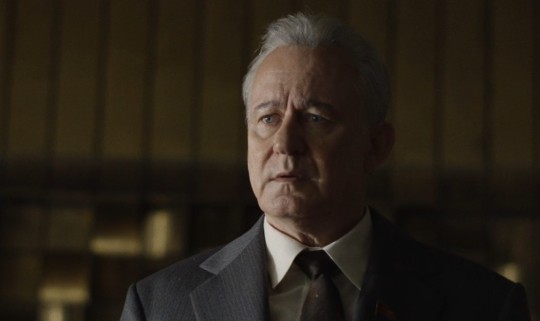
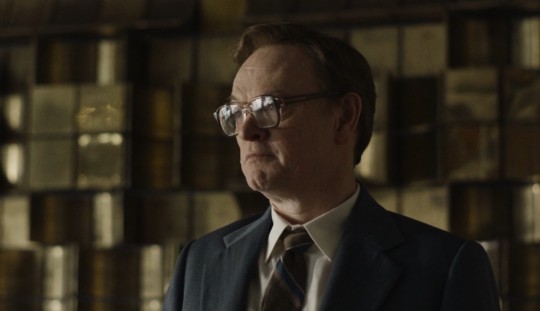
https://archiveofourown.org/works/19824418/chapters/47786230
“You’ll do it because it must be done.”
Valery thought he should be used to talking in front of an audience by now; flocks of young students with their inquisitive minds and their complicated questions, the occasional insolent remarks, even rude impatient colleagues – those were easy to deal with. He knew how to handle people like him, people aspiring to be him. He knew their names and résumés, he knew how their minds worked. But plain plant workers with plain questions? No, those were tough. He didn’t need the stress of unfamiliarity, not now, he had to go back to work urgently. But work - how? Not without the help of those strangers, those divers, those walking ashes. And convincing them to commit suicide by the end of an unprepared speech? Definitely not his area of expertise.
When shifting his gaze from their doubtful stares to the blueprint on the board, he would take shallow breaths as the straight lines and the rustling of paper were the only things in the hotel’s banquet room that reminded him of his life back in Moscow. Like a desperate student peeking through the window at a chirping sparrow while taking a difficult math test, the blueprint was his only link to familiarity, peace, sanity. As soon as he took his eyes from that piece of paper he’d have to face a room full of unimpressed faces. He spoke loudly, with vivid gestures, trying to convince everyone that he was a very confident professor with decades of experience.
But he wasn’t, not anymore.
And they knew.
He turned to Shcherbina like he had done two days ago, a lifetime ago, when their helicopter landed on the Chernobyl base camp. He wasn’t supposed to be doing this. He wasn’t supposed to be asking for help, not from a clueless partisan, what did he know?
Shcherbina was too lost in thought anyway, incapable of offering any help, incapacitated. Valery knew he shouldn’t have told him the truth but it was too late now, he was alone in a room of twenty reluctant men and his arguments were failing one after the other. His useless beads and mirrors.
Until the Ukrainian stepped in. His bulk alone should be enough to push anyone into action, Valery pondered as he watched him rise from his chair like a tired Atlas shaking off the dust from his shoulders. Those toughened workers should have seen enough in their lives to not be awed or intimidated by towering figures of authority but apparently it wasn’t Shcherbina’s status that spoke straight to their hearts.
It was his voice.
Deep and raspy and determined.
He was addressing their sense of duty and unity, telling them how needed they were. How essential. What great heroes they’d make. What kind of sacrifice they were capable of.
The Deputy Secretary was speaking directly to the blood in their veins.
It was a challenge for them and Boris – yes, Boris – knew how to talk to the crowds. It was his talent. It was what he was there for.
Ananenko.
Bezpalov.
Baranov.
Three men. Three were enough, more than enough. Had to be.
And it was Boris who made that happen.
Boris.
Valery knew the word sounded much better in his mind than when spitting it out like a crude warning or a cry for help. He didn’t realize back then how out of place, how unceremonious he sounded addressing the Deputy Secretary by his first name in front of those soldiers, a total stranger, a close friend of Gorbachev himself. How unforgivably inappropriate.
But for all his ironed suits and expensive shoes, his perfectly groomed hair and silver button cuffs Boris was just Boris to him. From day one. Valery didn’t know why he felt that eerie sense of intimacy but somehow his safe space wasn’t the blueprint anymore, or the sparrow outside the window. It wasn’t Moscow or the institute. It was the stranger in the ironed suit standing next to him, the man who had just convinced three souls to swim to their deaths.
It was the power in him.
The confidence.
Valery didn’t know if it was that sense of shared triumph that gave him a tickling down his throat, or the radiation.
He almost smiled.
Almost.
He squeezed his lips tight to smother any traits of joy - he wasn’t prepared for this, they hadn’t won yet - but he couldn’t help but turn to the source of that smile.
Boris was almost smiling too. Boris was looking back at him.
How could that be happening?
Valery felt the air freeze in his lungs.
We’re in this together, we always were. We were meant for this.
Were those Boris thoughts as well or was Valery just projecting?
He would never know. He would never tell Boris. He would never dare.
As Valery sank back into his chair, traitorous colour rising behind his glasses, he lifted his notes just enough to hide the sweat beading on his forehead. Boris’ unexpected smile from across the trailer had reminded him of the first time he realized how much he admired him - that glorious speech in the hotel banquet room. Valery didn’t know back then just how much he craved Boris’ attention, he was just staring in awe as the three men rose one after the other like lambs volunteering to be slaughtered, mesmerized by the thought of sacrifice and greatness, following the silver-haired pied piper to wherever he would take them.
If he’s to be my doom, so be it, Valery thought idly as he followed Boris out of the banquet room, entranced.
In that trailer he wasn’t listening to imaginary pipes anymore; he was working, no, he was glaring at the ashtray between his numb fingers, sweating, breathing, wondering if Boris was still looking, still smiling. Maybe it was better not to know, maybe he could stay safe within that ashtray or the pied piper would take him with him, never to return.
He didn’t look up. He didn’t want to know. He didn’t dare.
#chernobyl#chernobyl fanfiction#valoris#valoris fanfiction#valery legasov#boris shcherbina#ignorant hard-working bastard#the pied piper#ao3
41 notes
·
View notes
Text
Darkness - Boris
Part 15 of Starshine, Sky, and the Power of Rock.
I've been avoiding His Majesty all day, which is an impressive feat considering I'm his right-hand man. You'd think he'd notice an absence by his right hand. Whether or not he has, he hasn't requested my presence, which is fine by me.
There is a creeping feeling in my stomach, though, because the longer we don't discuss what happened yesterday the more I'm certain he's biding his time. For what reason, I'm not sure. Probably just to screw with my head.
Regardless, I won't be able to avoid him much longer.
Here I stand before the doors to the Premonitions Room. No doubt the ritual's already started without me. Now the question is should I endure the embarrassment of arriving late or endure His Majesty's wrath that should follow me skipping it altogether?
I heave a heavy sigh. I suppose my absence would be noticeable. I am pretty important, after all.
Okay.
Okay.
Open the door, fool!
The sound of scurrying feet jolts me from my thoughts. An underling stands in the middle of the hall, frozen by my presence. She's clearly new. No older than 15. She must have just been deployed last month with the other recruits. Maybe she would have known Sky. If she'd...
I silently curse myself for once again considering what will never happen as this girl stares at me, presumably in fear.
She bows her head. "Pardon my tardiness, sir."
I nod back. "Pardoned." I'd normally follow that with a warning but any threat right now would be blunted by the blatant hypocrisy of the situation.
She scuttles past me and makes to grab the door handles. I grab her collar. She tenses under my fingers but doesn't face me.
"Neither of us are to speak of this," I say.
She nods, eyes still on the door. "Yes, sir."
She holds the door for me as I enter then disappears amongst her peers the moment she gets the chance. If anything, she should be thanking me. After all, no one is going to notice her coming in late when they're all focused on me doing the same. I only wish the room weren't so silent, but I understand why it must be.
My footsteps echo horribly as I make my way over to His Majesty's side. I don't particularly care about all the underlings seeing me like this, considering they're obligated to respect me no matter what. It's the man I'm an underling to who's thoughts worry me.
His expression is unchanging, even by the time I stand at his side on the raised platform. As they do every time, his blood-red eyes laser-focus on the ornate glass casket before us. In it lies Princess Persephone, uncharacteristically peaceful with her hands delicately folded over her stomach. Her unbreathing figure would make someone who didn't know better think her dead. Or... I guess... dead in a way that makes her unable to wake up. I've never been clear on how to speak about the undead.
His Majesty is awake yet manages to be every bit as immobile as his sister. Princess Faylen, though, leans forward and openly glares at me from his other side. Knowing her, it could be anything from my tardiness to yesterday's failure to the wet dog smell she says I can never shake.
I'd better pay attention.
The entirety of the Band of Darkness watches us watch Princess Persephone, who outwardly does nothing but who we all know to be carrying out a very important job. Arguably, the most important job out of anyone in this room. Not that I think it justifies having her tag along on missions but I digress.
The slightest eyebrow twitch wrinkles the princess's porcelain face, which tells us the ritual is almost over. Her eyes snap open. The intense red makes her eyes almost look like gashes in her otherwise ghostly paleness. I'd never before understood how one could find vampires frightening. Then I met her.
Her gaze, constantly wide as if always hunting, remains on the ceiling for a couple blinks before falling on His Majesty. She smiles. He smiles back.
Servants have the casket's lid lifted. Princess Persephone sits up, stretching, then takes His Majesty's hand and lets him help her out. She tiptoes barefoot to face her audience. His Majesty joins her.
"What did you see?" he asks in his booming voice. It's the first I've heard of it since I left yesterday to carry out what turned out to be a mortifying failure. As used to his baritone as I am, my heart still skips a beat.
Princess Persephone smooths her hands over her pale pink nightgown as she recalls. "The enemy's palace," she says. "I saw it again. I've seen it a lot lately."
His Majesty's eyes very suddenly make contact with mine, even though I know he does this every time. As usual, I convey the exact same look to the scribe who sits below. He nods nervously and begins recording the princess's latest dream.
"The Crowns were there again, too. Both of them," she continues. "And the storm was even darker this time."
His Majesty nods, the spotlight above us dancing on the side of his glossy black hair that hasn't been shaved off. "Is that all?"
The princess doesn't speak for a moment. "Something new was in the storm today. There was a lighting bolt that struck the enemy's palace. A pink lightening bolt."
"Pink..." His Majesty mutters to himself.
Princess Persephone nods. "Hot pink."
"And that's all?"
"Mm hm."
"Very well. Good job, Persephone."
Princess Persephone beams at her brother. My sensitive ears pick up what Princess Faylen clearly had thought was a well-hidden "Ugh." I consider giving her a smile of my own to show that she's still appreciated but I figure I'm in it deep as it is and it'll likely be more trouble than it's worth.
His Majesty holds his arms out, then dramatically gestures to Princess Persephone. "Bow for your princess, the Heir to Darkness."
All non-royals in the room obey, including me. I'm still on my knee when feet shuffle beneath me and out the doors.
His deep sigh makes my blood run cold.
"We're alone, Boris."
I look up to see he's telling the truth. My shoulders slump, my muscles relax, and most importantly I get off the floor. But just because I'm not groveling his at feet anymore doesn't mean I'm any less nervous about the tongue-lashing I'm due.
His Ma-
Er-
Victor stares at me, arms crossed like a disappointed mother. "Tell me, Boris," he says. "How many worthless lives have you ended?"
I shrug. "You expect me to keep count?"
"Exactly," he says. "So forgive me if I'm a little confused why this girl - a girl, may I add, you had alone last time - is so hard for you to take care of."
"Vic, I can expla-"
"Don't 'Vic' me right now."
I mock-bow. "Pardon me, Your Majesty."
Victor grimaces. "Stop that."
"My point is," I say. "It's just really complicated with her. You remember our deal, right?"
"I remember every deal I make."
"And our deal was..."
"If she agreed to come back she would be pardoned and if she refused she would be disposed of," Victor says. "And she refused. Yet you didn't dispose of her. And she's, what, 14?"
"15," I say. "Her birthday was a couple months ago."
Victor pinches the bridge of his nose. "Do I look like I care?"
I know better than to answer him.
"You know I like you, Boris," he says.
"And you know I like you."
Victor turns from me and starts descending the steps leading to the floor. "Well, I thought you did."
I chase him. "What's that supposed to mean?"
He crosses his arms again, still not looking at me. "It was you against a teenage girl half your size, so I'm giving you the benefit of the doubt and assuming your problem isn't physical. My understanding is you care a lot about this girl, even if from my perspective she's been nothing but a major embarrassment."
My face flushes but I'd better keep quiet. Anything I say about her is bound to only dig me deeper.
"So, and correct me if I'm wrong," he continues, "You couldn't stand to harm her, to the point that you couldn't carry out a simple order. Hardly an order, really." He looks at me. "More like a request from a friend."
"Well, requests can be rejected."
His frown deepens. "Then it was an order."
I sigh, more from nerves than frustration though he can get very annoying about the whole king thing when he's upset. "If you know I'm still physically able to kill a teenage girl then why is me not killing this one such a problem? I mean, she's just one girl. There's only so much she could do. And knowing her, she's probably falling apart now that I'm not there for her. She won't last the week without me."
"It's not about the girl," Victor says. "It's about your convictions. Your loyalties. You had her in your grasp and you let her slip through your fingers because of... what... feelings? You have feelings now?"
"I've always had feelings," I argue. "We all do." Except maybe his sisters but now isn't the time for that conversation. "I know you do."
Victor lets himself soften just long enough for me to notice. "You know what I mean. The feelings that make you weak. The kinds that hold you back. Guilt. Fear. Compassion for the undeserving. The ones I had been convinced you were incapable of. But am I wrong that each of those feelings occurred in you yesterday when you had to face that brat?"
"Don't call her that," I can't keep myself from saying.
Victor huffs. "You just keep proving my point today, don't you! If you can't set your baggage aside and take care of a single traitor for me, then what else can't I trust you with?"
I try to think of a counterargument, but none come to mind. When I see past all those messy feelings, there's really no logical reason I shouldn't be able to do what he asks of me. It's not very unreasonable. Every traitor is an enemy gained, after all. And even if all Victor sees is a little girl, I see years and years of training. No, not just training. Sky poured her heart and soul into music. Embarrassing as it is that I was bested by a couple of teenagers, I hear so much of myself in every note of hers I can't be all that shocked that she was able to do it. Someone with that power shouldn't be left in the Band of Light's hands to corrupt. If she doesn't leave them willingly she'll have to be ripped from their hands, even if that means driving a stake through her heart.
"I guess that makes sense," I finally say. "You should be able to trust your right-hand man, right?"
Victor does the little closed-mouth smile he does where one of his fangs peeks through. "Yes, I should," he says. "I'll tell you what. Because I like you so much I'll let this one slide. One kid isn't very high on my list of priorities anyway. As long as you promise to take care of her if you ever see her again I'll forget about the whole ordeal. And when I forget something, the whole band does."
His words lift a huge weight off my chest. "Thank you, Vic," I say.
He nods. "Of course. Now, shouldn't you we preparing to move soon?"
"Move? Already? But we haven't discussed the dream at all."
"Vision," Victor corrects. "The Heir to Darkness doesn't just 'dream.'" He picks up the notes from the scribe's desk and looks them over. "There's little here we haven't heard before."
"Except that lightening bolt," I say.
"That's very true," he responds, then contemplates something. "There's been a lot of pink lately."
I nod in agreement. "In a lot of shades, too."
"But never hot pink before."
"Maybe she's just using a different word for a shade we're used to."
"Or maybe it's a new shade that means something," he counters.
"Have you considered having her learn the names of different shades of pink if it's so important?" I ask.
Victor strokes his chin. "I'll look into that."
I bite my tongue on the point that maybe she could just learn to better describe things. Or be more observant. Or anything that would be useful.
"Whatever the pink means, it doesn't change that we still have to follow the enemy's palace," Victor says.
I nod. "That makes sense."
"Well then," Victor says, making a shooing motion. "Sunday's almost over. You know what to do."
I bow, not for him but more to put myself back in the mindset that I'm nothing more than another underling of his. "Yes, sir."
I leave the room to begin the process of leading the others outside the building we call our base before it is shrunken down to a size that can be picked up and placed in a portable box. Then we're all on our horses and continuing the endless cycle of chasing that flying palace full of pompous royals, spoiled brats that dare to call themselves rock stars, and a traitor that's trying to convince herself she belongs amongst them.
I haven't a doubt His Majesty notices my silence as my mind runs in circles of guilt, rage, and fear for my next encounter with Sky, if it ever happens. But he responds with silence of his own. Even if he supposedly let the events of yesterday go, I can't forgive myself. It would have been so clean, so easy. The stake was mere inches from her chest. Yet I couldn't let it get any nearer, as if some barrier was in the way. I shudder in fury when I remind myself that I was that barrier. I held myself back. I was disloyal.
There's so few people in this world His Majesty can trust and all this time I've been honored to consider myself one of them. But he's right, if one kid can get me to crack how can he know I'm for real? How can I know I'm for real?
I run my thumb over my fingertips, barely feeling it thanks to the thick calluses. What happened to the Boris that can loot and burn homes without remorse? The Boris that's deaf to the cries of newly orphaned children? The Boris that can hear a traitor beg for mercy and not once consider giving it?
My grip on the reins tightens. He's still there. I mean here, he's still here. He's me. But he's in danger if I don't squash whatever made me stop myself from doing what I had to do yesterday.
Guilt. Fear. Compassion for the undeserving. His Majesty is right, those were the things I was feeling when I held that stake to her heart. I remember them really cementing when she grabbed my wrist. Her hands, small and cold with fingers as rough as mine. I'd guided them through so many lessons, poured years of blood, sweat, and tears into them. They were the hands she'd used to play out the darkest parts of her soul that only I was allowed to see. That's when I knew I couldn't be the one that made it so they'd never play again...
No.
The weakness I exhibited in that moment makes me sick. Every thought of her only brings that weakness back. Which means she's the source of my weakness. And a leader of the Band of Darkness has no place in his heart for weakness, because weakness breeds disloyalty.
I catch a glance at His Majesty. I'll stay loyal, my king. Don't you worry. I'll dislodge her from my heart. Crossing paths with her isn't a matter of if for me. It's a matter of when.
When we meet again, I'll do what I should have done the night I first saw her in that Academy uniform. I'll treat her like the traitor she is.
#werewolf oc#vampire oc#villain pov#werewolf#vampire#vampire king#boris ranulf#king victor#princess persephone
0 notes
Text
%news%
New Post has been published on %http://paulbenedictsgeneralstore.com%
Bbc news Coronavirus: ¿Qué es lo último con Brexit y otras grandes historias?

Bbc news
.spinner-container width:25%; top:20px; left:50%; margin-left:-12.5%; border-radius:8px; position:fixed; text-align:center; box-shadow:0 0 10px rgba(0,0,0,0.24); background:#fff; overflow:hidden; .spinner-container p font-family:'Roboto', Arial, sans-serif; color:rgba(0,0,0,0.87); margin:12px 0 16px 0; padding:0; font-size:12px; .spinner-container img width:22px; height:22px; margin:16px 0 0; padding:0;

Translating...
Image copyright AFP
Image caption In Syria, which recorded its first coronavirus death in slack March, the wrestle has entered its 10th year
Over the previous few months, the coronavirus pandemic has absorbed the total energy of the information cycle. There hasn't been an tournament be pleased it in our lifetimes.
Nonetheless this is now not the truth is to lisp that it is the excellent famous thing taking place on this planet bright now. So what is taking place on in different locations - and what took blueprint to some of the opposite colossal information experiences of the year?
Consider Brexit?
For roughly three years you hardly heard about anything else else in the UK. Now, obviously, the point of interest is on the coronavirus pandemic. Despite Prime Minister Boris Johnson requiring health middle therapy after contracting Covid-19 and the European Union and UK chief negotiators handiest recently popping out of coronavirus quarantine, Downing Road insists it must follow its common timetable.
The UK formally left the European Union on 31 January. Nonetheless we're now in a transition duration up to 31 December, at some point of which the UK is still treated comely remarkable as an EU member whereas negotiations proceed.
Britain's govt says an EU-UK commerce deal must still be in blueprint by the final day of the year. Nonetheless although no longer, the UK may possibly possibly no longer lengthen the transition duration previous that closing date.
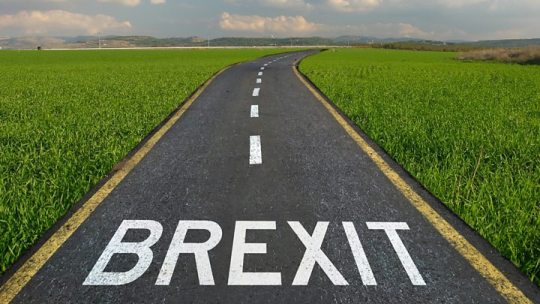
Media playback is unsupported to your machine
Media captionBrexit: How did we score here?
The premise in the support of the transition duration turn out to be as soon as to minimise disruption introduced on to industry and jog back and forth between the UK and the EU. It will even be extended by a year or two - which the EU thinks would be a impartial correct pass beneath the instances.
There has handiest been one spherical of EU-UK commerce negotiations up to now. They restart this week by video convention and all facets lisp they'll possess their handiest to possess correct and instant development. Nonetheless time is slipping away.
Brussels additionally asks whether UK and EU corporations - already combating the upheaval attributable to the coronavirus - need one more colossal commerce come the pause of this year. Nonetheless whatever they concentrate on, EU leaders may possibly possibly no longer formally demand the UK for an extension. The tight timetable turn out to be as soon as determined by Boris Johnson, they lisp. A name to prolong - if there may be one - must come from London.
A ceasefire few expected to final is preserving in Idlib, for now, because the final insurrection-held establish in northwest Syria braces for the expected onslaught of the lethal coronavirus.
"Other folk are breathing for the time being, and that is also considered as a side catch of the pandemic," says Hassan Hassan of the Middle for World Policy. "The ceasefire is inserting by a thread, nonetheless it no doubt's inserting on the opposite hand."
The 5 March truce agreed by Russia and Turkey halted a unhealthy escalation after Ankara sent hundreds of its troops all over the border to study out to live a Syrian offensive to retake this final province lost in 9 punishing years of wrestle.
Nonetheless Idlib's breathing establish is additionally fraught with apprehension of this recent enemy. The province's health system has been decimated by battling, along with the blistering air advertising and marketing and marketing campaign by Russian and Syrian warplanes. With regards to a million displaced folks, sheltering inside flimsy tents, or on open flooring, have faith few defences in opposition to the highly effective Covid-19.
"There is a humanitarian and political imperative… for a total, instant nationwide ceasefire at some point of Syria," acknowledged UN Special Envoy to Syria, Geir Pedersen, in his most up-to-date briefing to the UN Security Council.

Media playback is unsupported to your machine
Media captionCoronavirus: Fears of virus in Idlib refugee camps
Turkey and Russia, who support opposing facets, now name the shots.
"I catch no longer concentrate on Turkey or Russia judge this ceasefire will shield for a actually lengthy time," says Dareen Khalifa, Senior Analyst with the World Crisis Community. "It left key points unresolved."
That contains the ability forward for the jihadist neighborhood Hayat Tahir al-Sham (HTS), which dominates Idlib.
The HTS, sceptical of this truce, is purported to be regrouping. The Syrian and Turkish armies are additionally taking support of this live to supply a get to in preparation for the subsequent spherical of war.
It may possibly possibly possibly possibly effectively be bright a subject of time - nonetheless now, it appears to be like, is no longer the time.
For practically a month, the speed amongst Democrats to glance who would select on US President Donald Trump in the favorite election turn out to be as soon as in deep freeze. Broken-down Vice-President Joe Biden had a commanding lead in the primaries, nonetheless self-professed democratic socialist Bernie Sanders - as soon as map to be the entrance-runner - turn out to be as soon as unwilling to concede.
Meanwhile, snort after snort postponed their predominant votes thanks to the coronavirus pandemic. Every candidates cancelled all public events and handiest issued video statements and conducted interviews from their homes.
That modified on Wednesday, as Sanders suspended his advertising and marketing and marketing campaign, all nonetheless making certain that in November American voters will select between Trump and Biden.
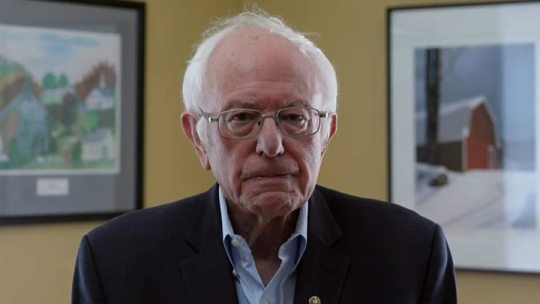
Media playback is unsupported to your machine
Media captionSanders: "I wish I had better information"
Precisely when - and how - the two candidates may be formally nominated by their events is in some doubt, on the opposite hand. The Democrats have faith already moved their national convention from mid-July to August in the hope that a gathering of hundreds of activists, officers and celebration devoted will then be doable, each from a health and logistical standpoint. Nonetheless that recent date, at the side of the Republican convention location for the pause of August, still appears to be like questionable.
As for the speed itself, Trump has considered a microscopic bump in his poll standings for the reason that pandemic began, doubtless because of the his ubiquitous tv presence in each day afternoon White Residence press conferences.
Biden still holds a microscopic support in head-to-head matchups, on the opposite hand, suggesting the speed is destined to be shut. Nonetheless there is just not any telling what the national mood may be in a couple of weeks, let on my own when the November vote casting day arrives.
The warfare in Yemen, which entered its sixth year in March, has lengthy been labelled the enviornment's forgotten wrestle. With the previous few weeks seeing one more spike in the battling, and because the enviornment's consideration is firmly mounted in different locations, Yemen's wrestle has felt extra forgotten than ever.
Two weeks ago, assaults on cities in Saudi Arabia, claimed by Houthi rebels, led to a series of retaliatory airstrikes on Northern Yemen by the Saudi-led coalition.
It is no longer the truth is bright the battling that Yemen's civilians are having to suffer. I remember reporting on the cholera epidemic in 2016, and reminiscences of the nation's incapability to answer to the spread of the illness are still fresh in my mind. It turn out to be as soon as heart-breaking to survey as folks that had diminished in dimension the illness stumbled on they'd no health middle to flip to.

Media playback is unsupported to your machine
Media captionThe hidden victims of the Yemen wrestle
That Yemen is now going thru the specter of a recent ruthless illness, one which requires health middle beds and ventilators the nation doesn't have faith, is a horrible prospect.
The announcement of a ceasefire this week may be welcome information for most Yemenis, nonetheless the heavy toll of the previous half of-decade methodology that although the wrestle turn out to be as soon as to total as of late, it may possibly possibly well select decades for the nation to get better. Six years of bombings and destruction have faith resulted in what the UN has called "the enviornment's worst humanitarian crisis".
The scale, severity and complexity of the nation's wants are staggering. The wrestle has deeply fractured Yemen's financial system and diminished its public institutions, its infrastructure and its health system to rubble. Eighty per cent of the total population require exterior abet bright to continue to exist. And but, the UN launched this week that it turn out to be as soon as reducing its operations in the nation, citing lack of funding.
Because the spectre of Covid-19 looms better, folks all over Yemen, fully mindful that their nation merely may possibly possibly no longer be ready to manage in opposition to the upcoming threat, are bracing themselves.
In early November, the Peaceable South Wales govt launched a snort of emergency and issued the predominant catastrophic fire warning for the reason that rating turn out to be as soon as keep in blueprint 10 years ago.
File-breaking heat, right winds and the relentless drought - which lasted for at the least three years in some areas - fuelled the bushfires. The blazes left 11 million hectares scorched and extra than 2,000 properties destroyed. Australia's natural world turn out to be as soon as decimated. A billion animals had been lost and photography of burned koalas and kangaroos made world headlines.

Media playback is unsupported to your machine
Media captionHell to excessive water: Australia’s summer season of extremes
The controversy and anger in opposition to the top minister and the ability he dealt with the crisis and his ability to climate commerce had been as remarkable a component of the fable because the fires themselves.
At final the rain came, flooding some areas whereas ending years of drought in others. There turn out to be as soon as enough rain to keep out most of the fires till they had been all beneath shield a watch on. It turn out to be as soon as a grand reprieve for the volunteer firefighters who had no longer stopped working for months and had been exhausted.
On 31 March, the Peaceable South Wales Rural Fire Provider launched the legit pause of essentially the most unfavorable bushfire season the snort and the nation has experienced. Even though the fires are out, the injury is still there. The bushfires had a catastrophic affect on the financial system - especially in the tourism sector.
Many communities have faith been making an strive to rebuild, nonetheless it no doubt's been a uninteresting and complex job, now made extra sophisticated by the truth all the pieces is on shield thanks to Covid-19. Many households are panicked that with the govt. now turning their plump consideration to tackling the virus, their very dangle losses and struggles may be forgotten.
function gtElInit() var lib=new google.translate.TranslateService(); lib.setCheckVisibility(false); lib.translatePage('en', 'es', function (progress, done, error) done );
0 notes
Text
Week in Review: Nothing these people say makes the least bit of sense

By Ian Dunt
On a quite fundamental level, the core propositions of the political parties have ceased to make any sense. The Tories are campaigning on the basis that they'll get Brexit done, which they will not. Labour are campaigning on the basis of being a social justice party, which they are not. And the Lib Dem are campaigning on the basis of stopping Jeremy Corbyn coming to power, which they cannot.
Boris Johnson is perhaps the first prime minister to campaign on the basis of a plan which directly refutes his message. His slogan is Get Brexit Done. It's clearly been weaponised and deployed like a gatling gun. But his deal quite emphatically does not get Brexit done. Quite the opposite, it sets up the basis of continued tribal warfare in parliament and the country.
The deal he did with the EU provides a transition until December 2020, with a July 2020 deadline for agreeing an extension to it. That's a nightmare of course, because it separates out the reality of the no-deal cliff-edge from the latest point at which the British government needs to make a decision on it. This morning, Johnson offered an "absolutely guarantee" he wouldn't extend transition.
That's probably nonsense. In all likelihood, he'll refuse to do it in July, when it'll be easy, and will then somehow have to desperately find a way to extend in December, when it isn't.
There's little to no chance of this thing being done in the 12 month period laid out. First, the British government needs to find out what it wants. What's the priority - a deal with the EU or one with the US?
They not mutually exclusive exactly, but you do need to make key decisions in one direction or the other on issues like level-playing field provisions, geographical indications, standards and, most importantly, agricultural rules. Once the government makes that decision, it needs to make sure it can get parliament behind it and not suffer the pincer movement Theresa May went through - ERG loonies on the right and opposition parties on the left ganging up to kill it.
Then you'd need to negotiate it. The closer you stay, the less there is to negotiate, but the more Johnson would risk among the ERG. The further away, with decent market access, the more there will be to work out. Then parliament will need to pass it and so, in all likelihood, will all the other parliaments in the EU, including some regional parliaments. And then it'll need to be implemented, which is likely to involve all sorts of systems and infrastructure.
So basically, it isn't going to happen, not for years. Brexit won't be done. We'll be in the same hellscape of tribalism - of culture war in a technocratic straitjacket - that we've been in for the last three years. With a new set of artificial timetable cycles and all the repeated national humiliation that entails.
Labour's commitment, on the other hand, is to social justice. It has pledged to put that notion at the "heart of everything a Labour government will do". But this must be a new definition of social justice given that it appears to show no interest in or aversion to anti-semitism.
There's a reason this issue refuses to go away. The party is incapable of dealing with it. And the reason it is incapable of dealing with it is that there really seems to be something ugly and broken within its leadership structure.
Yesterday, a diverse group of public figures wrote a letter saying they refused to vote Labour because of its association with anti-semitism. The signatories included the author John Le Carree, the Wikipedia founder Jimmy Wales, the historians Antony Beevor, Tom Holland and Dan Snow, and Fiyaz Mughal, the founder of the anti-Islamophobia group Tell Mama.
"The coming election is momentous for every voter, but for British Jews it contains a particular anguish: the prospect of a prime minister steeped in association with anti-semitism," it read.
The content is damning. But actually it was the response to it which was most troubling. A Labour spokesperson said: "It's extraordinary that several of those who have signed this letter have themselves been accused of antisemitism, Islamophobia and misogyny. It's less surprising that a number are Conservatives and Lib Dems."
And that's it. That's the problem right there. No introspection. No sense of even the slightest flicker of self-awareness, or concern, or moral judgement. No basic decency. Just deep-seated tribalism, the kind of mentality that presumes that all criticism is, by definition, the product of a conspiracy among political enemies.
It's the sneering that gets you in the end. The fact that that is the instinctive response. It reveals something profoundly ugly, on a psychological level, in Corbyn's leadership team. It is, in a way, a true reply to that letter, because it reveals precisely the mentality which created the circumstances in which it was necessary.
For that reason, it's not hard to justify Jo Swinson's aversion to Corbyn. Throughout this campaign, she has spent at least as much time attacking Labour as she has the Tories.
Quite probably, she really does believe him to be beyond the pale. But there is also a strategic element. Swinson's route to electoral gains lies in picking up Tory-Lib Dem marginals. There's not much Labour vote to squeeze. She needs Tory Remainers, who are appalled by Brexit and Corbyn, but might take fright and head back to the Conservatives if a Labour government seems a real possibility.
But where does this commitment ultimately leave her? If Johnson wins a majority, fine - although that means the Brexit she has dedicated herself to fighting will happen. If it's a minority Labour government - the chances of a majority one remain highly unlikely - things get more complicated.
Swinson has ruled out any cooperation with Labour after the election. In her ideal scenario, Labour would be large enough to form a minority government which could govern with just SNP support. But if that's not enough, if they need more numbers, the spotlight will be on her.
Whichever way you shake it, no matter how distant they make it, the Liberal Democrats will agree to support certain Labour bills. And on that basis Corbyn will be able to make the case that he can form a government.
Swinson will claim that all she's doing is supporting bills the party happens to back. But the reality would be different. In truth, she would be facilitating a Corbyn government. And voters who listened to her repeated assurances she would do no such thing will not be impressed.
It would, as it happens, be the right thing for the Lib Dems to do in those circumstances. It would secure a second referendum for starters. And failing to do so - getting embroiled in a shoddy battle instead of showing responsibility - would surely just result in another election and a Tory majority. But Swinson will have a hard time explaining herself, because the things she is saying now will be directly contradicted by the things she would have to do then.
But then that's par for the course in this election. There are always lies and misrepresentations in politics. But we do now seem to be perfecting the form.
0 notes
Text
Carwyn Jones speech to Labour Party Conference
Carwyn Jones AM, Leader of Welsh Labour, First Minister of Wales, speaking at the Labour Party Conference in Brighton today, said:
***CHECK AGAINST DELIVERY***
I want to begin by extending my thanks to Christina Rees, our Shadow Secretary of State for Wales. Sadly she can’t be with us this week as she’s nursing a broken foot.
I don’t think there’s any truth in the rumour that she broke it kicking Alun Cairns around Parliament in the first week back, but we’ll ask her when we see her.
We all wish you a speedy recovery, Chris.
Secondly, let me say thank you to Jeremy for his continuing friendship and leadership.
Thank you, Jeremy for the dignity you showed in a tough general election campaign.
The Tories came after you in a personal and offensive manner, and you stood up to that onslaught and led the party with great determination and defied the odds.
This time last year, the Tories thought they were marching to a 100-seat majority. Right now, they’re scared of their own shadows, let alone another general election. What a turn around that is.
Conference, when I heard Theresa May was giving a speech in Florence, I thought how apt. Not so much in relation to the Renaissance, but more with a thought to the works of that great medieval poet, Dante. It has been clear to me for some time that the Department for Exiting the European Union regard the “Divine Comedy” as some sort of instruction manual. That masterpiece imagines in glorious detail the dark and terrifying journey through the nine circles of hell.
Well, we’ve been going on our own journey for 15 months and still remain in the first circle of hell – limbo – a remarkable achievement. But, then Dante did have Virgil as his spiritual guide.
David Davis has got Nigel Farage. The book really is worth a read as Brexit re-interpreted. At one point, at the close of chapter XXI, Dante witnesses a demon mobilising his troops by using “an ass as a trumpet.” Which goes to show that every century has its own Boris.
Conference, this week in Wales we marked the 20th anniversary of the vote to establish devolution in our country. It was a turning point for Wales, and a turning point for our Party. The list of achievements is one of which we can be proud – and it belongs not just to Welsh Labour, but to the whole Party and movement who made devolution possible.
· Unemployment in Wales - routinely lower than the UK average. More jobs, better jobs – Welsh Labour delivering in Government.
· Wales, the first country to move to a deemed consent model for organ donation in the UK. People owe their lives to that change in the law. Better laws, saving lives, Welsh Labour delivering in Government.
· Free school breakfasts in primary schools. Giving children the best start to the day, giving parents a helping hand, giving teachers the attention they deserve in the classroom. Welsh Labour delivering in Government.
· The attainment gap between better off and poorer pupils in England and Scotland continues to grow – in Wales it continues to shrink. A fair start to everyone in Wales, no matter where you’re born – that is Welsh Labour delivering in Government.
· Our university students in Wales getting the best deal anywhere in the UK.
· And who gets the best deal of all? Those students who can least afford university – that is Welsh Labour delivering in Government.
But, it isn’t just about policy. It’s also about having a voice and someone to fight your corner. This week I gave a cautious welcome to the news that Tata Steel and ThyssenKrupp entered the first stage of a merger deal. A deal that should safeguard sites and thousands of jobs in Wales.
Does anyone honestly think that without devolution, without a Welsh Labour Government determined to take measures to save that industry, putting money on the table when others looked away, that those steel jobs would still be in Wales today?
Would the Tories have knocked down walls for the people of Port Talbot, Shotton, Newport or Llanelli? We all know the answer to that.
With our colleagues in the trades unions, our MPs, our AMs and local councillors, Welsh Labour stood up for the steel industry – and we did what those banners and badges asked us to do – we saved our steel.
Conference, we are proud to work with our trades union colleagues in Government.
Together we have built a genuine social partnership and together we are making Wales a Fair Work Nation.
And Conference, earlier this month our Trades Union Act received Royal Assent.
That means that the pernicious attempts of the Tory Government to attack workers’ rights in Wales have been dis-applied, and, once again, workers in Wales have the protections we fought so hard to achieve. Protections everyone deserves.
That’s Welsh Labour delivering in Government.
Devolution has given Wales a voice. And with Welsh Labour that voice speaks the language of social justice, fairness, good work, decent pay and thriving communities.
Devolution has given us something else. A new-found confidence. It is something I see every day in young people in work, and in our schools and colleges. So where has that confidence come from? If you could personalise it, you’d have to give credit to my predecessor, Rhodri Morgan. As you know, Rhodri passed away earlier this year, leaving behind a fantastic roller coaster of a political career, a wonderful family and an ocean of anecdotes. In May the Welsh Parliament held the closest thing Wales will ever have to a state funeral, and we gave Rhodri the perfect send off.
It started late. It finished even later. In between there was a fantastic mix of poetry, politics, sport, laughter and tears. And at the end, no-one really thought about Rhodri the politician, but Rhodri as a big-hearted, intelligent and inquisitive man who loved his family above all else. A fine role model, who we all miss.
Rhodri always said that Labour did best when it managed to mix together the mushy peas of old Labour with the guacamole of New Labour. Now, I’ve been in Rhodri’s kitchen and I can tell you that when it came to culinary combinations, Rhodri was not always the person you would go to – but on the politics, he, as so often, was absolutely right. He was absolutely right about the need for our Party to reflect all sections of our membership, and all parts of this country.
That was the key to our success in Wales in the last three elections.
When the Party at UK level was under serious pressure, our unique and united Welsh Labour identity meant we remained relevant and competitive in the Assembly and local elections, when sadly others struggled. It was the unity that gave us success against the odds. And when in the last days of the general election the whole party surged, it meant we, in Wales, were starting from a higher base-line and, as a result, achieved 50% of the vote for the first time in 16 years.
Our identity as a Party is robust, authentic and complementary to the UK Party as a whole. And, just as a country we will not countenance a roll-back of our devolution settlement; there can be no question of Welsh Labour’s long fought for, and hard won voice being diluted as we look to the future of our Party. I know that both Jeremy and Tom understand this, and I welcome their unwavering support for Wales. Thank you, both.
Because Conference, we know Labour works best when we work together. Together, we fought a hugely successful general election campaign – not just holding on to what we had, but winning back seats for Labour.
Vale of Clwyd – according to the bookmakers, Tories were 1/5 on to win. Result? Labour Gain. Gower – according to the bookies, Tories were 1/9 on to win. Result? Labour Gain. Cardiff North – Tories were 1/9 on. Result? Labour Gain.
Working together we have exposed the Tories on broken promise after broken promise. On rail electrification in the north and the south – and we know what’s coming next – they’ll axe Swansea’s Tidal Lagoon.
But, because Welsh Labour is in Government – there are things we can do. We are already delivering on our manifesto promises.
· 100,000 new good quality, all-age apprenticeships.
· The most generous childcare offer for working parents anywhere in the UK.
· And 20,000 more affordable homes.
We can also deliver on priorities for the future of our NHS.
There is no privatisation of the NHS in Wales – and whilst we have a Welsh Labour Government there will be no privatisation of the NHS in Wales. Only in Wales are ambulance crews hitting their targets – because we’ve worked with the service and designed a better way of working. And next week, the Welsh Government will publish new guidance for our pioneering legislation on safe nurse staffing levels in Wales.
Conference, Wales is the first country in Europe to legislate on nurse staffing levels. I am proud that Wales has taken the lead in this area, empowering nurses and ensuring the resources are there to care sensitively for patients. Legislation that the Party promised in the UK manifesto in May, already being delivered by a Labour Government in Wales.
And working together we are making our communities better, fairer places to live.
When Carolyn Harris MP began her brave and dignified campaign to end child burial charges in the UK, we in Wales did not wait for the Tory Government to act. We said, yes, that is the right thing to do, and, as a result, the Welsh Labour Government has announced the abolition of all child burial charges in our country. That is what we can do when we work together.
And the country needs us to work together more than ever before, as we fight the fundamentalists pursuing a hard Brexit. We are fighting tooth and nail against the Tory power grab, dressed up as the EU Withdrawal Bill. It shows up their Government as simply incapable of listening to other people’s views, or respecting their legitimate interests – in other words, as lacking the basic skills needed to negotiate successfully.
And looking at the way in which they are failing the country in their negotiations with the EU, I guess we shouldn’t be surprised.
I’m delighted at the support we are receiving from Labour colleagues in Parliament at fighting this real threat to devolution as we have known it for the past 20 years.
I’m also incredibly proud of the work we have done together already – our team in Cardiff Bay has worked hand in glove with Keir Starmer and the front bench in developing our Brexit policies. As a result of that work, in Labour we now have a sensible, evidence-based, economically sound set of principles and ideas that can see this country through Brexit in an orderly manner.
Contrast that with the spectacle of the Tory approach. Sorry, correction – the various Tory approaches. Does anyone really know who speaks for them on Brexit anymore?
Where has the Prime Minister of this country gone? If, before the general election, the country felt as though it had a robot for Prime Minister, we’d now be forgiven for thinking we have a hologram.
She went to the country and asked for the support of our communities for a hard Brexit, the country said no. The country said no to some other things as well – our older people said no to being taken for granted. Wales said no to being short-changed. Scotland said no to independence. And crucially, our young people said no to being ignored. They said, through their votes, what we all feel - Britain deserves better than this. This country deserves a Labour Government in Westminster.
A Government that actually cares about the future.
I know that the people of Wales need that more than ever. Under the Tories, we have had to take £1billion out of our public services in Wales. That’s the annual budget of the entire North Wales health board. Our communities are resilient, but they’re being unfairly punished. And with Theresa May and the Tories they will be asked to give yet more. To give up. To give up their livelihoods, their libraries, their leisure centres, and their right to a fair deal. To give up hope. Enough is enough. It is time for hope.
It is time for Labour, in Wales and in Westminster. Standing up for Wales. Working for fairness. Working, together. Winning, together. That’s a future the country hopes for and that’s the country we can deliver. Together for Wales. Together for Britain.
2 notes
·
View notes
Link
By Andrew Levine / Counterpunch.
Photo by Matt Johnson | CC BY 2.0
The pre-Socratic philosopher Heraclitus taught that “all is flux” — that “nothing stays still,” and therefore that “no one can step in the same river twice.”
The political philosophers of Greco-Roman antiquity understood this to be a metaphysical claim without political implications. That has remained the consensus view to this day.
To be sure, more than two thousand years after Heraclitus, philosophers working within the tradition of “classical German philosophy” did develop philosophical positions that evince a certain affinity with what Heraclitus seems to have had in mind, and that do resonate politically. The connection, however, was indirect.
Hegel’s philosophy is, by far, the most important and influential example. As an inveterate systematizer, and a political and legal philosopher of the first order, he joined notions associated with politics, conceived abstractly, with aspects of Heraclitean metaphysics, understood loosely.
But Hegel and his followers were interested mainly in elucidating history’s structure and direction, and in the “dialectical” structure of the real. What they had to say about political notions and institutions was partly shaped by those abstruse philosophical concerns. But it too was largely free standing.
Hegelian ideas influenced Karl Marx’s thinking, but, in many respects, Marxist theory broke away from its Hegelian roots. This was especially true on matters of political concern. One would be hard pressed to find anything of consequence that is inherently Heraclitean in the Marxist purchase on politics.
Like other political philosophers before and since, Marx and Marxists after him took the continuity and temporal persistence of key elements of the political sphere for granted. From their purview as political actors, and as thinkers reflecting on politics, it is, and feels as if it is, possible to step in the same river not just twice, but many times.
Thus, even after Hegel and Marx, the Heraclitean doctrine falls within the metaphysician’s ambit, not the political philosopher’s.
It took Donald Trump, a buffoon incapable of holding a serious thought, to change that sense of things.
As a thinker, Trump is a non-entity who has not, and obviously cannot, change political theory. But he has profoundly affected the lived experience of those who do think, casually or in more sustained ways, about the politics of the country he leads.
Thanks to the peculiarly undemocratic way we elect presidents, and thanks to Hillary Clinton’s ineptitude, a troubled male adolescent in an old man’s body now holds power enough to turn the world into a wasteland. And because his mind does indeed resemble an ever-changing river, nothing now does stay still for we inhabitants of Trumpland.
This is why it feels to so many of us as if, in our political universe, all is indeed in flux; as if booming buzzing confusion is all there is.
***
The problem is not just that we have a president whose instincts are vile and who is in way over his head. It is worse than that. We are adrift and the old, familiar moorings are gone. The situation is too intolerable to endure for long, even if we do somehow manage to live through it. It has to end, and it will end because it must.
The process is painfully slow, but we just might now be living through a turning point, a watershed moment out of which new moorings will emerge. Even in Trump’s America, events have a way of forcing change, despite the best efforts of the beneficiaries and guardians of the status quo.
However, we must never underestimate the power of wishful thinking, and we should always be mindful of Hegel’s dictum about the owl of Minerva taking flight only at the setting of the sun. What he meant was that the “meaning” of historical events only becomes clear in retrospect, and only after the passage of time.
With those caveats in mind, I would venture that far-reaching changes really are underway, and that the pivotal moment came with the recent spate of devastation brought on by hurricanes in the Atlantic.
Ultimately, political power rests on force, but regimes rule by shaping public perceptions. “Opinion,” wrote David Hume (1711-1776), “is the true foundation of the state.” America in the Age of Trump is no exception. How and when the Trumpian flux ends depends, in large part, on how people perceive events and therefore on how the power structure’s propaganda system spins the stories it tells. Under the pressure of events, those stories can sometimes spin out of control.
Too bad for defenders of industrial capitalism in its current phase that forces of nature – hurricanes, for example – can overwhelm even the best efforts of the most persuasive propagandists.
It is a familiar phenomenon: when there is an automobile accident, traffic slows down to look; people are inveterate voyeurs. And so it was that when Hurricanes Harvey and Irma struck Texas and Florida, cable and broadcast networks had a ready made audience for their “breaking news” brand of 24/7 disaster porn.
The journalists on the job did creditable reporting, notwithstanding occasional self-congratulatory boasting. Their boast was that they were performing a vital public service by helping to inform actual and potential storm victims. In truth, they did hardly any of that, and neither were they supposed to in any case. For as long as there have been radios, designated local, not national or international, media have been tasked with keeping affected publics informed. They do their job well, and this time was no exception.
The background meteorology they provided was of high quality too – or rather it would have been had the cable networks and National Public Radio not effectively proscribed mention of global warming and climate disruption. One could only marvel at how skillfully scientists and journalists skated around that colossal elephant in the room. Print media did only slightly better.
And although the impact, of Irma on Cuba could hardly pass unnoticed, there was little or no discussion of how much better impoverished Cuba’s level of hurricane preparedness is compared to the United States’. Neither did they call attention to Cuban efforts to help their Caribbean neighbors. Cuba took an even harder hit than Florida.
This is hardly surprising in view of the still substantial political influence of counter-revolutionary Cubans in Florida and elsewhere, and the six decades long history of American efforts to crush that socialist island – in order to make it, again, a de facto colony of the United States.
They also made short shrift of enormous levels of destruction in places of which Americans know little and care less (except when planning vacations or evading taxes). At first, even America’s Caribbean “possessions” were only mentioned in passing.
Hurricane fatigue is not the only reason why so much less attention now is being paid to Hurricane Maria. Maria has done more damage than Irma, but the fact that, this time around, it is mainly brown skinned people who are mainly bearing the brunt matters more. The fact that some of them, as Puerto Ricans or Virgin Islanders, happen to be American citizens — in theory, if not quite in practice –changes little. America First is a liberal fixation too.
It is tempting to say that all that hurricane coverage was good only for entertaining television viewers in places far removed from danger. But, with the benefit of hindsight, it may turn out also to have been good for something far more momentous.
By bringing the consequences of industrial capitalism’s effects on the earth’s atmosphere into too clear a view to be ignored, all that coverage could cause many of America’s most recalcitrant climate change deniers finally to accept the scientific consensus on global warming – Trump and his minions notwithstanding.
Such things do happen, even when “the bad guys” are well resourced and well organized. Hardly anyone nowadays seriously questions the scientific consensus on the deleterious health consequences of smoking, for example.
If this happens now with global warming, and the wall-to-wall coverage of Harvey and Irma plus now also of Maria and Jose, are part of the reason why, then, despite themselves, the cable news networks and other corporate media really would have something to brag about.
For now, though, perhaps the only genuinely salutary result of all that coverage – and of reporting on the devastating earthquakes in Mexico – has been to tone down media-driven war mongering. However, to the world’s detriment, that benefit is short-lived; the war mongering is heating up again.
The Republican Party is beneath contempt, and Trump, the people around him, and the benighted folk who still support him make right thinking people despair for the human race. But, when it comes to reviving dormant Cold War animosities and flirting with nuclear annihilation, Democrats, smarting from Hillary Clinton’s unexpected and unnecessary defeat, are worse.
Their media flacks are, if anything, even more of a disgrace. Rachel Maddow is only the tip of the iceberg.
But efforts to revive the Cold War didn’t start with the evening lineup on MSNBC. Ever since it became clear that Reagan lied to Gorbachev about America’s and, insofar as there is a difference, NATO’s intentions in expanding to the east, the West has been vilifying Russia whenever that nuclear power has tried, no matter how meekly, to defend itself against efforts to encircle it – not just in the Baltic and in the old Warsaw Pact “satellite” nations, but also in former Soviet Republics up to and including Ukraine.
The difference now is that, having largely recovered from the economic shock brought on by the sudden inclusion of its formerly post-capitalist economic system into the global capitalist order, Russia is now better able to fight back than it was when Boris Yeltsin was abjectly doing Bill Clinton’s bidding. Another difference is that Western, mainly American, provocations now run right up to the borders of the Russian Federation itself.
The vilification of the Russian government therefore didn’t start once it dawned on Democrats that, even with Trump for an opponent, defeat was not categorically out of the question. But it was not until the waning days of the 2016 campaign that Democrats, their media flacks in tow, turned on Russia and its president, Vladimir Putin, with a fury unseen in decades.
What ingrates! Spurred on by Secretary of State Clinton and her band of neoconservative and liberal imperialist advisors, Barack Obama had gotten himself into a number of jams in Syria and elsewhere from which Russian diplomacy extricated him. And yet, in Democratic circles, Putin became Public Enemy Number One.
The vilification campaign then took on a life of its own, as Democrats worked assiduously to make Trump’s comparatively reasonable attitude towards relations with Russia a campaign liability.
No doubt, the billionaire’s reasons for being reasonable have more to do with venality and greed than geopolitical strategy or common sense. And the river he is currently stepping into seems to have wound its way back into Clintonesque territory in any case. But, on this point, Democrats and Democratic media are still even worse.
Those fabricators and purveyors of self-serving wisdom blame Russia for doing what the United States has long been doing with virtual impunity all over the world. Interfering in other countries’ elections is the least of it. Before the Soviet Union imploded, there were more restraints; in recent decades, there has been little holding them back. Keeping it that way is a goal of American foreign policy. The hypocrisy is mind-boggling.
And when that hypocrisy isn’t enough, corporate propagandists can bring up the reincorporation of Crimea into the Russian federation in accord with the wishes of the vast majority of the local population. Or they badmouth Edward Snowden or Wikileaks, or RT, Russia Today.
The latter move is especially nonsensical. Watch even the best of the MSNBC journalists and pundits – Chris Hayes, for example. Then tune in RT to compare and contrast. It will be ridiculously obvious to anyone whose head is screwed on right who the real propagandists are, and who are the real journalists.
If the world survives Trump, there is bound to come a time, when, as happened with the Pentagon Papers, everyone will know who the real scoundrels and real heroes were. For the time being, though, corporate media are doing all they can to keep that day far off.
The real villain, in all this, is our deeply entrenched party system in which ideologically like-minded Democrats and Republicans exercise duopoly power.
For all practical purposes, ours would be a one party state – except that Democrats and Republicans have staked out different positions on social issues of little or no economic or geopolitical consequence. This has made them appealing, or not, to different constituencies. It has also led to an unprecedented degree of dysfunctional party polarization.
And it has made Republicans so odious that even Democrats can sometimes look good.
***
Preferences do not always reflect unconditioned beliefs and desires. They, and the choices that follow from them, are often shaped as well by the situations in which people find themselves.
This explains why the Democratic Party can seem more palatable than it otherwise would to voters for whom the main or only reason to vote Democratic is that, all things considered and by most relevant measures, Republicans are worse. It also explains why voters who are in denial about the shortcomings of the Democratic Party are sometimes able to work up enthusiasms for Democrats in the Clinton mold.
It is the sour grapes story in reverse; the situation Democratic voters confront is the opposite of the fox’s in the Aesop fable. When the fox discovered that the grapes he coveted were beyond his reach, he came to believe that they were sour – not on the basis of evidence, but because beliefs and desires tend to adjust to objective conditions. This made him lose interest in the grapes he could not obtain, and satisfied with ones he could.
When voters who would otherwise recoil from the awfulness of the lesser evil party come to believe, not unreasonably, that they have no more effective way to vote against Republicans than by voting for Democrats, they often, like the fox, become OK with Democratic candidates — finding them sweet, as it were, or not too unpalatable.
What they are doing is minimizing “cognitive dissonance,” the discomfort that comes from holding on simultaneously to opposing beliefs.
Cognitive dissonance reduction is a motivator of voter behavior everywhere, but especially in a duopoly party system like ours.
It will be this way for as long as that system governs our political life; and this won’t change until the respective centers of our semi-established parties fail to hold.
Those two parties have been moving rightward ever since the neoliberal turn took hold in the late seventies, but, throughout the process, their grip over the ambient political culture has remained secure. Until now, that is; until the Trump phenomenon emerged seemingly from nowhere.
By breaking so many norms and expectations, and by overturning so many of the rocks under which his hardcore supporters had been residing, the Donald, inadvertently and unknowingly but inexorably, set in motion a chain of events that is replacing the status quo with a level of chaos, of experienced flux, that opens up all kinds of possibilities for far-reaching positive, or negative, change.
Trump spreads chaos because his only conviction is himself and because, beneath the orange coif, there is no there there. He is currently the Republican standard bearer, but, in truth, he is neither a Republican nor a Democrat. He is a nothing upon whom ungodly power has been thrust.
But for the more formidable competition on the Democratic side and the realization that the fix was in, that Clinton had the Democratic nomination sewn up, Trump could have gone after the nomination of either party.
But how could a vainglorious egotist resist the temptation to enter a race where the front-runners were Jeb Bush, the hapless brother of the worst (now the second-worst) president ever, and Little Marco Rubio, and where addle-brained libertarians like Ted Cruz and theocrats of the Ben Carson and, God save us, Mike Pence variety set the tone?
Trump therefore decided to give free rein to his Republican side, going on to win that wretched party’s nomination handily.
Between him and the GOP’s grandees, it was a marriage of convenience, made in hell. The miscreants needed each other. Trump had no interest in governance, and no idea how to govern. He only wanted to look good and, of course, to enhance his and his family’s bottom line. Meanwhile, Republican apparatchiks had lots of experience running the state, and their donors were salivating at the prospect of having a fellow plutocrat calling the shots. Thus the marriage was duly consummated.
Now that unholy union is hovering on the brink of divorce – not only because Trump’s “high crimes and misdemeanors” and those of his family members and closest associates are catching up with him, and not even because the man is an embarrassment too great for even the terminally greedy to abide. When the marriage craps out, it will be because it is becoming clear to the GOP leadership that Trump cannot be trusted, that he will betray everyone and everything whenever it suits his unpredictable and always transient purpose.
This is becoming more obvious all the time – to such an extent that it is dawning even on Trump’s most resolute rank-and-file supporters that their savior would lie down with Crooked Hillary herself, if he thought there was some percentage in it.
Trump has already made nice with Nancy Pelosi and Chuck Schumer. Could he be angling for a different marriage of convenience made in hell, this time with Clintonite Democrats who, unlike Hillary, have finally moved on?
When the realization that this is possible finally and fully registers in the minds of the profoundly benighted, the time when the Donald could shoot somebody on Fifth Avenue and not lose support, as he famously boasted he could, will be over. The chaos will subside, the Donald will be toast, and it will stop feeling as if Heraclitus got the American political scene spot on right.
Throughout the 2016 campaign, Trump was on course for wrecking the GOP, but when the Electoral College handed him the presidency last November, that prospect seemed to fade away. It now looks like it was only put on hold.
There is hope for Democrats too. Thanks to initiatives from Trump opponents who had previously been acquiescent or politically inactive, and to indications that, with single-payer health insurance as an intra-party wedge issue, the Sanders-Warren wing of that neoliberal party may actually be getting off the Clinton treadmill, it is at least possible that it will fracture too. It would be premature to celebrate such a development, and there is no guarantee, in any case, that that the consequences would be beneficial. But it is not too soon to hope.
If Trump does irreparably harm the Republican Party, and if he has indeed set in motion forces that will wreck the Democratic Party “as we know it” as well, then, if the world is not destroyed in the process, the Trumpian moment may someday seem, in retrospect, to have been a blessing in disguise, a positive development of historical dimensions.
There are obviously better and cleaner ways to undo the duopoly system that has degraded our politics so profoundly. For the time being though, like the fox’s sour grapes, they lie out of reach.
Bernie Sanders is not about to split the Democratic Party, much less to lead a political revolution, as his “Our Revolution” followers claim. The tragedy is that he could if he wanted to, but he doesn’t and won’t.
On the other hand, Jill Stein would, but cannot – not with corporate media working assiduously to hold the line.
Compared to Sanders, Stein would be as good or better in every way – especially on matters of empire and war and peace. But, as the Green Party’s candidate in the past two presidential contests, her efforts were bound to fail; and there is no reason to expect that it will be any different in the years ahead.
And so Trump is all there is. If the Mueller investigation goes well, and if Republicans rise to the occasion – in other words, if events unfold just right — Trump’s effect on the duopoly will come to be seen as a gift that neither he nor anyone else intended to provide.
Any beneficial consequences that follow would be no less welcome on that account; it would not be the first time that the end has justified unseemly means. Like the fox in the fable, persons seeking progressive change would just have to adapt.
It would be one more irony to add onto History’s long list if, for his own nefarious reasons, Trump ends up transforming the political scene in ways more beneficial than even the handful of genuinely progressive Democrats dare to imagine.
If, despite himself, Trump somehow pulls that off, he could almost be forgiven for the harm he has done, and for the all-consuming flux now enveloping our imperiled world.
ANDREW LEVINE is the author most recently of THE AMERICAN IDEOLOGY (Routledge) and POLITICAL KEY WORDS (Blackwell) as well as of many other books and articles in political philosophy. His most recent book is In Bad Faith: What’s Wrong With the Opium of the People. He was a Professor (philosophy) at the University of Wisconsin-Madison and a Research Professor (philosophy) at the University of Maryland-College Park. He is a contributor to Hopeless: Barack Obama and the Politics of Illusion (AK Press).
from Home http://ift.tt/2fLfYgd
0 notes
Link
http://ift.tt/2qq4i6A
Authored by Robert Parry via The Strategic Culture Foundation,
Where is Stanley Kubrick when we need him? If he hadn’t died in 1999, he would be the perfect director to transform today’s hysteria over Russia into a theater-of-the-absurd movie reprising his Cold War classic, “Dr. Strangelove,” which savagely satirized the madness of nuclear brinksmanship and the crazed ideology behind it.
A scene from “Dr. Strangelove,” in which the bomber pilot (played by actor Slim Pickens) rides a nuclear bomb to its target in the Soviet Union
To prove my point, The Washington Post on Thursday published a lengthy story entitled in the print editions “Alarm at Russian in White House” about a Russian photographer who was allowed into the Oval Office to photograph President Trump’s meeting with Russian Foreign Minister Sergey Lavrov.
The Post cited complaints from former U.S. intelligence officials who criticized the presence of the Russian photographer as “a potential security breach” because of “the danger that a listening device or other surveillance equipment could have been brought into the Oval Office while hidden in cameras or other electronics.”
To bolster this alarm, the Post cited a Twitter comment from President Obama’s last deputy CIA director, David S. Cohen, stating “No, it was not” a sound decision to admit the Russian photographer who also works for the Russian news agency, Tass, which published the photo.
One could picture Boris and Natasha, the evil spies in the Bullwinkle cartoons, disguised as photographers slipping listening devices between the cushions of the sofas.
Or we could hear how Russians are again threatening to “impurify all of our precious bodily fluids,” as “Dr. Strangelove” character, Gen. Jack D. Ripper, warned us in the 1964 movie.
Watching that brilliant dark comedy again might actually be a good idea to remind us how crazy Americans can get when they’re pumped up with anti-Russian propaganda, as is happening again now.
Taking Down Trump
I realize that many Democrats, liberals and progressives hate Donald Trump so much that they believe that any pretext is justified in taking him down, even if that plays into the hands of the neoconservatives and other warmongers. Many people who detest Trump view Russia-gate as the most likely path to achieve Trump’s impeachment, so this desirable end justifies whatever means.
Boris and Natasha, the evil spies from the Rocky and Bullwinkle shows
Some people have told me that they even believe that it is the responsibility of the major news media, the law enforcement and intelligence communities, and members of Congress to engage in a “soft coup” against Trump – also known as a “constitutional coup” or “deep state coup” – for the “good of the country.”
The argument is that it sometimes falls to these Establishment institutions to “correct” a mistake made by the American voters, in this case, the election of a largely unqualified individual as U.S. president. It is even viewed by some anti-Trump activists as a responsibility of “responsible” journalists, government officials and others to play this “guardian” role, to not simply “resist” Trump but to remove him.
There are obvious counter-arguments to this view, particularly that it makes something of a sham of American democracy. It also imposes on journalists a need to violate the ethical responsibility to provide objective reporting, not taking sides in political disputes.
But The New York Times and The Washington Post, in particular, have made it clear that they view Trump as a clear and present danger to the American system and thus have cast aside any pretense of neutrality.
The Times justifies its open hostility to the President as part of its duty to protect “the truth”; the Post has adopted a slogan aimed at Trump, “Democracy Dies in Darkness.” In other words, America’s two most influential political newspapers are effectively pushing for a “soft coup” under the guise of defending “democracy” and “truth.”
But the obvious problem with a “soft coup” is that America’s democratic process, as imperfect as it has been and still is, has held this diverse country together since 1788 with the notable exception of the Civil War.
If Americans believe that the Washington elites are removing an elected president – even one as buffoonish as Donald Trump – it could tear apart the fabric of national unity, which is already under extraordinary stress from intense partisanship.
That means that the “soft coup” would have to be carried out under the guise of a serious investigation into something grave enough to justify the President’s removal, a removal that could be accomplished by congressional impeachment, his forced resignation, or the application of Twenty-fifth Amendment, which allows the Vice President and a majority of the Cabinet to judge a President incapable of continuing in office (although that could require two-thirds votes by both houses of Congress if the President fights the maneuver).
A Big Enough ‘Scandal’
That is where Russia-gate comes in. The gauzy allegation that Trump and/or his advisers somehow colluded with Russian intelligence officials to rig the 2016 election would probably clear the threshold for an extreme action like removing a President.
President Donald Trump being sworn in on Jan. 20, 2017. (Screen shot from Whitehouse.gov)
And, given the determination of many key figures in the Establishment to get rid of Trump, it should come as no surprise that no one seems to care that no actual government-verified evidence has been revealed publicly to support any of the Russia-gate allegations.
There’s not even any public evidence from U.S. government agencies that Russia did “meddle” in the 2016 election or – even if Russia did slip Democratic emails to WikiLeaks (which WikiLeaks denies) – there has been zero evidence that the scheme resulted from collusion with Trump’s campaign.
The FBI has been investigating these suspicions for at least nine months, even reportedly securing a Foreign Intelligence Surveillance Act warrant against Carter Page, an American whom Trump briefly claimed as a foreign policy adviser when Trump was under fire for not having any foreign policy advisers.
One of Page’s alleged offenses was that he gave a speech to an academic conference in Moscow in July 2016 that was mildly critical of how the U.S. treated countries from the former Soviet Union. He also once lived in Russia and met with a Russian diplomat who – apparently unbeknownst to Page – had been identified by the U.S. government as a Russian intelligence officer.
It appears that is enough, in these days of our New McCarthyism, to get an American put under a powerful counter-intelligence investigation.
The FBI and the Department of Justice also reportedly are including as part of the Russia-gate investigation Trump’s stupid campaign joke calling on the Russians to help find the tens of thousands of emails that Hillary Clinton erased from the home server that she used while Secretary of State.
On July 27, 2016, Trump said, apparently in jest, “I will tell you this, Russia: if you’re listening, I hope you’re able to find the 30,000 emails that are missing.”
The comment fit with Trump’s puckish, provocative and often tasteless sense of humor, but was seized on by Democrats as if it were a serious suggestion – as if anyone would use a press conference to seriously urge something like that. But it now appears that the FBI is grabbing at any straw that might support its investigation.
The (U.K.) Guardian reported this week that “Senior DoJ officials have declined to release the documents [about Trump’s comment] on grounds that such disclosure could ‘interfere with enforcement proceedings’. In a filing to a federal court in Washington DC, the DoJ states that ‘because of the existence of an active, ongoing investigation, the FBI anticipates that it will … withhold all records’.
“The statement suggests that Trump’s provocative comment last July is being seen by the FBI as relevant to its own ongoing investigation.”
The NYT’s Accusations
On Friday, in the wake of Trump’s firing of FBI Director James Comey and the President’s characterization of Russia-gate as “a total hoax,” The New York Times reprised what it called “The Trump-Russia Nexus” in a lead editorial trying to make the case of some fire behind the smoke.
Former Trump foreign policy adviser Carter Page
Though the Times acknowledges that there are “many unknowns” in Russia-gate and the Times can’t seem to find any evidence of collusion, such as slipping a Russian data stick to WikiLeaks, the Times nevertheless treats a host of Trump advisers and family members as traitors because they’ve had some association with Russian officials, Russian businesses or Russian allies.
Regarding Carter Page, the Times wrote: “American officials believe that Mr. Page, a foreign policy adviser, had contacts with Russian intelligence officials during the campaign. He also gave a pro-Russia speech in Moscow in July 2016. Mr. Page was once employed by Merrill Lynch’s Moscow office, where he worked with Gazprom, a government-owned giant.”
You might want to let some of those words sink in, especially the part about Page giving “a pro-Russia speech in Moscow,” which has been cited as one of the principal reasons for Page and his communications being targeted under a FISA warrant.
I’ve actually read Page’s speech and to call it “pro-Russia” is a wild exaggeration. It was a largely academic treatise that faulted the West’s post-Cold War treatment of the nations formed from the old Soviet Union, saying the rush to a free-market system led to some negative consequences, such as the spread of corruption.
But even if the speech were “pro-Russia,” doesn’t The New York Times respect the quaint American notion of free speech? Apparently not. If your carefully crafted words can be twisted into something called “pro-Russia,” the Times seems to think it’s okay to have the National Security Agency bug your phones and read your emails.
The Ukraine Case
Another Times’ target was veteran political adviser Paul Manafort, who is accused of working as “a consultant for a pro-Russia political party in Ukraine and for Ukraine’s former president, Viktor Yanukovych, who was backed by the Kremlin.”
New York Times building in New York City. (Photo from Wikipedia)
Left out of that Times formulation is the fact that the Ukrainian political party, which had strong backing from ethnic Russian Ukrainians – not just Russia – competed in a democratic process and that Yanukovych won an election that was recognized by international observers as free and fair.
Yanukovych was then ousted in February 2014 in a violent putsch that was backed by U.S. Assistant Secretary of State Victoria Nuland and U.S. Ambassador Geoffrey Pyatt. The putsch, which was spearheaded by right-wing nationalists and even neo-Nazis, touched off Ukraine’s civil war and the secession of Crimea, the key events in the escalation of today’s New Cold War between NATO and Russia.
Nazi symbols on helmets worn by members of Ukraine’s Azov battalion. (As filmed by a Norwegian film crew and shown on German TV)
Though I’m no fan of U.S. political hired-guns selling their services in foreign elections, there was nothing illegal or even unusual about Manafort advising a Ukrainian political party. What arguably was much more offensive was the U.S. support for an unconstitutional coup that removed Yanukovych even after he agreed to a European plan for early elections so he could be voted out of office peacefully.
But the Times, the Post and virtually the entire Western mainstream media sided with the Ukrainian coup-makers and hailed Yanukovych’s overthrow. That attitude has become such a groupthink that the Times has banished the thought that there was a coup.
Still, the larger political problem confronting the United States is that the neoconservatives and their junior partners, the liberal interventionists, now control nearly all the levers of U.S. foreign policy. That means they can essentially dictate how events around the world will be perceived by most Americans.
The neocons and the liberal hawks also want to continue their open-ended wars in the Middle East by arranging the commitment of additional U.S. military forces to Afghanistan, Iraq and Syria – and perhaps a new confrontation with Iran.
Early in Obama’s second term, it became clear to the neocons that Russia was becoming the chief obstacles to their plans because President Barack Obama was working closely with President Vladimir Putin on a variety of projects that undermined neocon hopes for more war.
Particularly, Putin helped Obama secure an agreement from Syria to surrender its chemical weapons stockpiles in 2013 and to get Iran to accept tight constraints on its nuclear program in 2014. In both cases, the neocons and their liberal-hawk sidekicks were lusting for war.
Immediately after the Syria chemical-weapons deal in September 2013, key U.S. neocons began focusing on Ukraine as what National Endowment for Democracy president Carl Gershman called “the biggest prize” and a first step toward unseating Putin in Moscow.
Assistant Secretary of State for European Affairs Victoria Nuland, who pushed for the Ukraine coup and helped pick the post-coup leaders
Gershman’s grant-giving NED stepped up its operations inside Ukraine while Assistant Secretary Nuland, the wife of arch-neocon Robert Kagan, began pushing for regime change in Kiev (along with other neocons, including Sen. John McCain).
The Ukraine coup in 2014 drove a geopolitical wedge between Obama and Putin, since the Russian president couldn’t just stand by when a virulently anti-Russian regime took power violently in Ukraine, which was the well-worn route for invasions into Russia and housed Russia’s Black Sea fleet at Sevastopol in Crimea.
Rather than defend the valuable cooperation provided by Putin, Obama went with the political flow and joined in the Russia-bashing as key neocons raised their sights and put Putin in the crosshairs.
An Unexpected Obstacle
For the neocons in 2016, there also was the excited expectation of a Hillary Clinton presidency to give more momentum to the expensive New Cold War. But then Trump, who had argued for a new détente with Russia, managed to eke out an Electoral College win.
Perhaps Trump could have diffused some of the hostility toward him but his narcissistic personality stopped him from extending an olive branch to the tens of millions of Americans who opposed him. He further demonstrated his political incompetence by wasting his first days in office making ridiculous claims about the size of his inaugural crowds and disputing the fact that he had lost the popular vote.
Widespread public disgust over his behavior contributed to the determination of many Americans to “resist” his presidency at all junctures and at all costs.
Peter Sellers playing Dr. Strangelove as he struggles to control his right arm from making a Nazi salute
Russia-gate, the hazy suggestion that Putin put Trump in the White House and that Trump is a Putin “puppet” (as Clinton claimed), became the principal weapon to use in destroying Trump’s presidency.
However, besides the risks to U.S. stability that would come from an Establishment-driven “soft coup,” there is the additional danger of ratcheting up tensions so high with nuclear-armed Russia that this extreme Russia-bashing takes on a life – or arguably many, many deaths – of its own.
Which is why America now might need a piercing satire of today’s Russia-phobia or at least a revival of the Cold War classic, “Dr. Strangelove,” subtitled “How I Learned to Stop Worrying and Love the Bomb.”
May 16, 2017 at 09:22AM
http://ift.tt/2qmlGLv
from Tyler Durden
http://ift.tt/2qmlGLv
0 notes
Photo
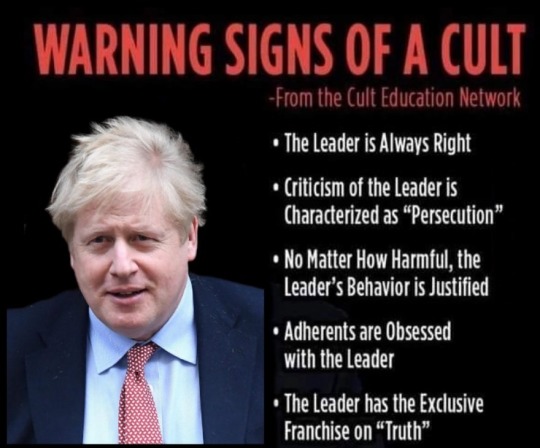
#UK politics#boris johnson#alexander boris de pfeffel johnson#boris is a fucking moron#boris is incapable of telling the truth#fuck boris#fuck the tories
42 notes
·
View notes
Text

#UK politics#boris johnson#alexander boris de pfeffel johnson#GB news#definitely not a news channel#boris is incapable of telling the truth
10 notes
·
View notes
Text
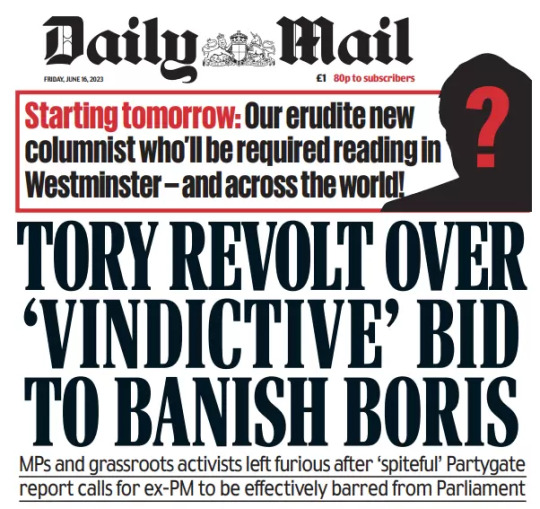
The Daily Fail is getting a mysterious new "erudite" columnist who will be "required reading in Westminster - and across the world!"
I wonder who on earth it could possibly be?
Yes, it's this fucking clown:
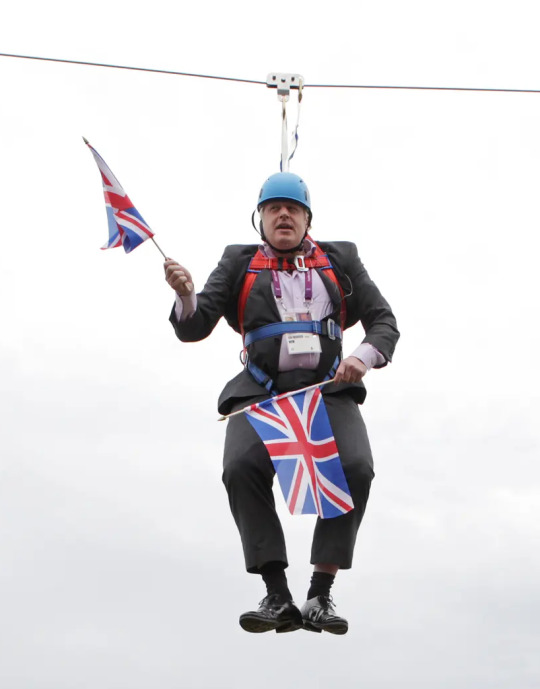
A person who, let's not forget, was fired by The Times for inventing a quote, lied countless times about EU directives for The Telegraph, lied to the Queen about the need to prorogue parliament as his first act as PM, and has just been found guilty of contempt of Parliament.
And he's just broken the ministerial code by not clearing this new position with the parliamentary Advisory Committee on Business Appointments.
I'm sure with his well documented racism, misogyny, and homophobia, he will fit right in at the Fail. Although maybe someone should warn them that he was frequently late handing in copy at the Telegraph and The Spectator (for which he was the editor...)
#boris johnson#alexander boris de pfeffel johnson#daily mail#daily fail#boris is incapable of telling the truth#boris is a fucking moron#fuck boris
10 notes
·
View notes
Photo

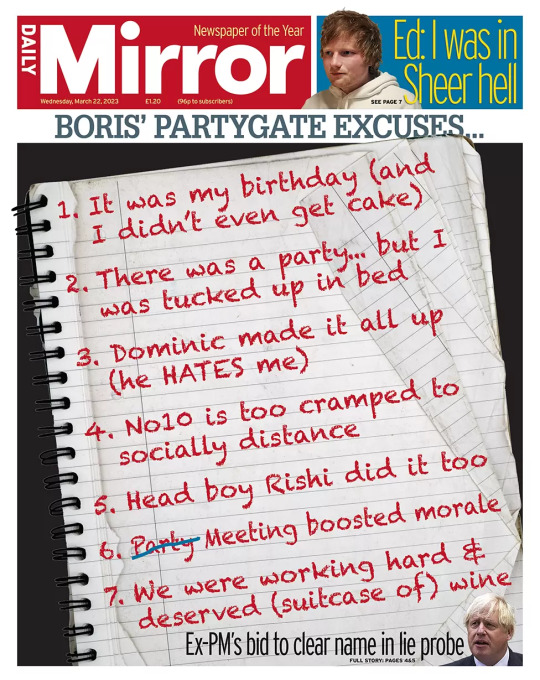
#UK politics#boris johnson#alexander boris de pfeffel johnson#boris is a fucking moron#boris is incapable of telling the truth#partygate#the saga continues#fuck boris#fuck the tories
19 notes
·
View notes
Photo
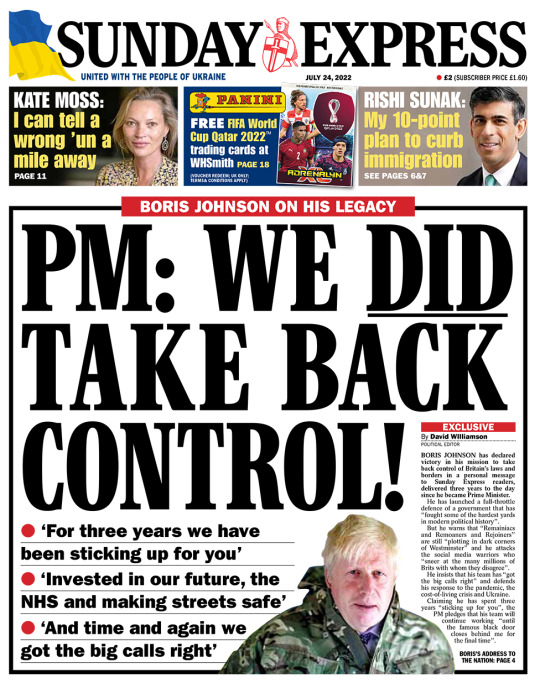
He is so full of shit.
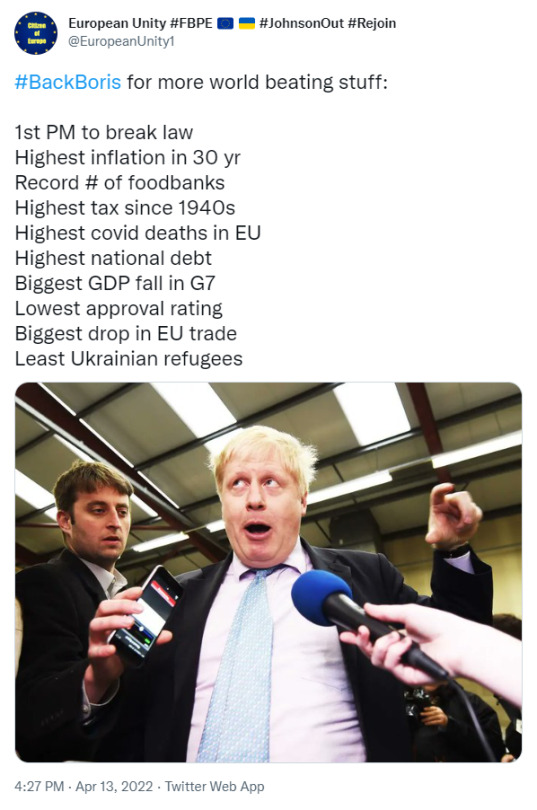
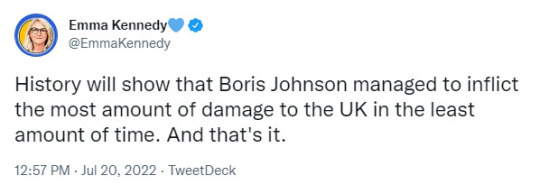
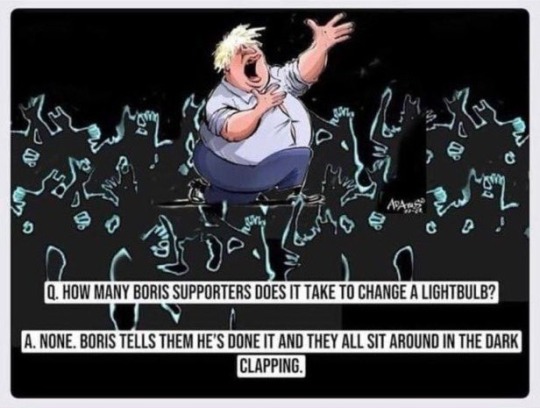
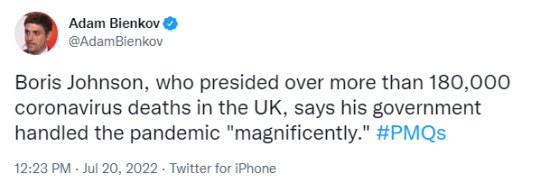


#UK politics#boris johnson#alexander boris de pfeffel johnson#boris is a fucking moron#boris is incapable of telling the truth#fuck boris#fuck the tories
24 notes
·
View notes
